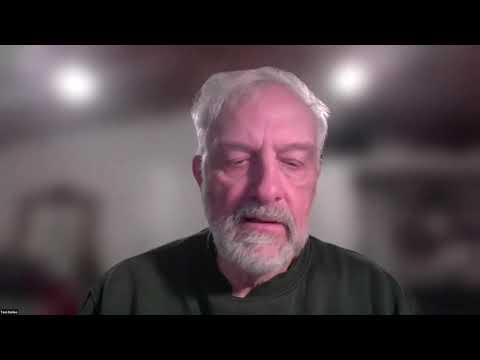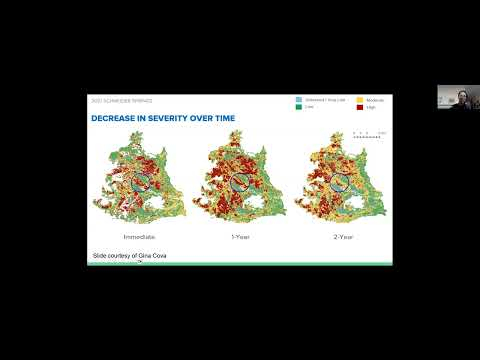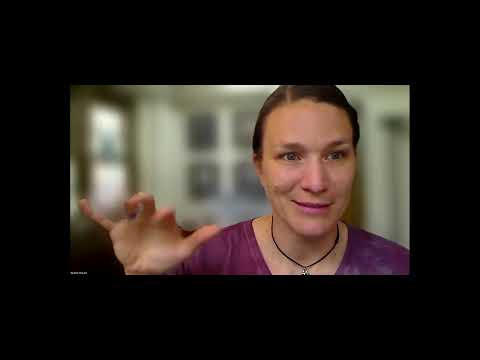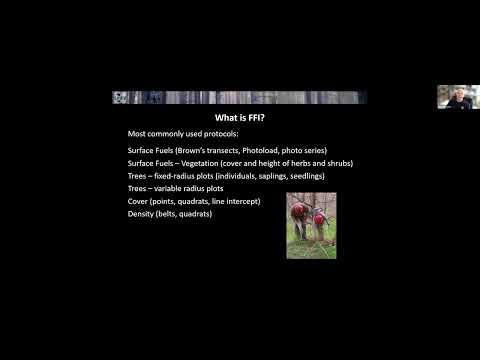Overview
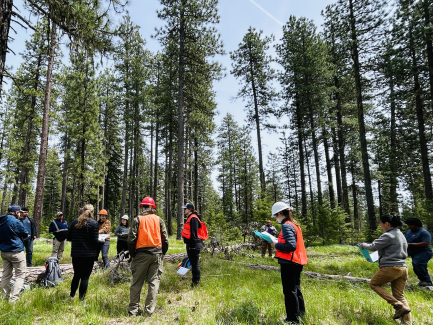
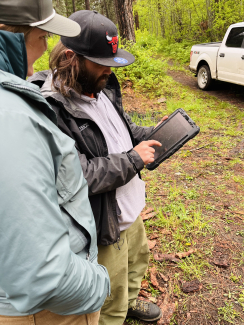
In 2023, the NW Bureau of Indian Affairs (BIA), US Forest Service (USFS) R6 Ecology Program, Northern Rockies Fire Science Network (NRFSN), and Northwest Fire Science Consortium (NWFSC), came together to implement a hybrid virtual/fieldbased monitoring workshop modeled after the excellent 2021 training that was developed by the Oak Woodlands & Forests Fire Consortium, the Lake States Fire Science Consortium, and the Huron-Manistee National Forests. Building off the recorded videos provided by the 2021 event, the 2023 workshop supplemented in additional live virtual and in-person training from local experts in the NW and Rocky Mountain Regions. Field days were hosted on the Warm Springs and the Spokane Reservations, with each focusing on specific questions that the Tribe and hosts wanted to address with their monitoring. This allowed participants to not only get an opportunity to practice baseline fire effects monitoring protocol, but also to modify standard protocols to the objectives and questions being asked by the host agency in their unique ecosystems.
Since the success of the 2023 workshop, a planning committee has been formed from the participating agencies/consortia with the goal to continue the trainings every two years. These events help support the fire and fuels goals of multiple agencies in the regions and build upon the resources and recordings available to the programs.
2025 Fire and Fuels Monitoring Workshop
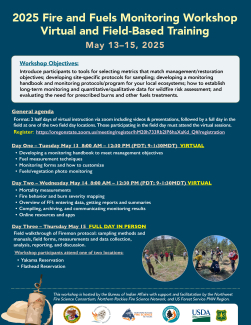
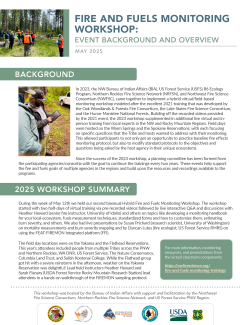
During the week of May 12th we held our second biannual Hybrid Fire and Fuels Monitoring Workshop. The workshop started with two half-days of virtual training via pre-recorded videos followed by live interactive Q&A and discussions with Heather Heward (senior fire instructor, University of Idaho) and others on topics like developing a monitoring handbook for your local ecosystem, fuels measurement techniques, standardized forms and how to customize them, estimating burn severity, and others. We also had live presentations by Susan Prichard (research scientist, University of Washington) on mortality measurements and burn severity mapping and by Duncan Lutes (fire ecologist, US Forest Service RMRS) on using the FEAT-FIREMON Integrated platform (FFI).
The field day locations were on the Yakama and the Flathead Reservations. This year’s attendees included people from multiple Tribes across the PNW and Northern Rockies, WA DNR, US Forest Service, The Nature Conservancy, Columbia Land Trust, and Salish Kootenai College. While the Flathead group got hit with a severe rainstorm in the afternoon, weather on the Yakama Reservation was delightful! Lead field instructors Heather Heward and Sarah Flanary (USDA Forest Service Rocky Mountain Research Station) led attendees in a hands-on walkthrough of the FIREMON sampling protocol.
NWFSC-hosted presentations
These sessions were presented by experts on monitoring topics relevant to the northwest. We also showed how-to and overview videos on key monitoring topics that were created by non-NWFSC entities as part of the trainings. These videos plus additional resources from partners and collaborators on monitoring workshops in other regions are listed and linked below the NWFSC-hosted presentations.
Workshop introduction + Tom DeMeo on "Why Monitor"
Susan Pritchard: Mortality measurements and the Tripod Fire Burn Severity Mapping Tool
Heather Heward: Estimating fire severity and composite burn index
Duncan Lutes: Overview of FFI and entering data, getting reports, and making summaries from the outputs
How-to videos
Developing a monitoring handbook for your local ecosystem to meet management objectives
Presented by Brian Stearns (From NPS Fire Monitoring Handbook, measurement rotation, plot locations and density)
Fuels measurement techniques
Presented by Brian Stearns (Brown’s fuel transects, duff/litter)
Forms – Standard forms and how to customize
Presented by Brian Stearns
Introduction to the Photoload Sampling Technique
Presented by World of Wildland Fire (WETC)
Fuels/vegetation photo monitoring
Presented by Brian Sturtevant
Mortality measurements
Presented by Paul Priestley
Fire severity and composite burn index
Presented by Brian Sturtevant
Fire behavior and burn severity mapping
Presented by Brian Stearns
Online resources and Apps: Excel fuels calculator, FFI, FFI Lite, FCCS, Survey 123
Presented by Brian Stearns
Fire effects on timber value measurements
Presented by Joe Marschall, Oak Woodlands & Forests Fire Consortium. This video covers research assessing fire effects on red oak timber quality. Concepts presented are relevant to other types of timber value measurements as well.
Compiling results and archiving data and forms; communicating and reporting monitoring results; Updating or adapting monitoring handbook; evaluating monitoring programs and changing protocols
Presented by Brian Stearns
More monitoring resources!
As noted, NWFSC has adapted these monitoring workshops from those started by partner fire science exchanges in the JFSP Fire Science Exchange Network. If you are looking for more resources, including pre-made forms, field examples of techniques, and more, please see the workshop pages from our partner exchanges who have also hosted versions of this workshop:
Oak Woodlands & Forests Fire Consortium Monitoring Workshop page
Contains additional videos as well as demonstration videos for 11 different field measurements. Go to page.
Lake State Fire Science Consortium Monitoring Workshop page
Contains additional videos as well as presentations from the monitoring videos, a list of references and protocols, and lists of resources such as protocols, training manuals, data sheets, calculation forms, example reports, and more. Go to page.
